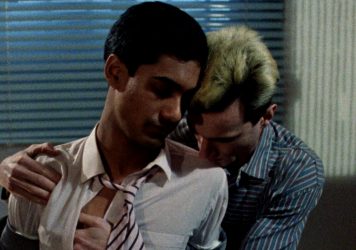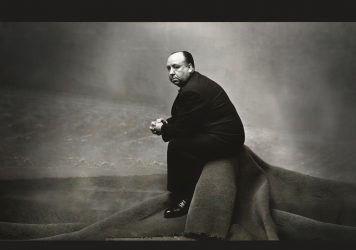Mark Cousins’ lyrical exploration into the life and work of a little-known modernist painter from Scotland.
Mark Cousins documentaries always originate from a deeply subjective position. Poetic voiceovers and associative form shape his films as visual essays, articulating an inherent tension in documentary filmmaking: that of questioning the nature of getting to an “objective truth” and its proximity to a subjective projection.
Cousins places this tension front and centre in his latest film, A Sudden Glimpse to Deeper Things, an artist portrait of Scottish modernist painter Wilhelmina (Willie) Barns-Graham. The film opens with a photograph of the artist in the later stages of her life, asking us to ponder how much we learn from this image, as opposed to how much we project onto it. Naturally, the follow-up question this prompts is, how close can the documentary filmmaker get to their subject, especially posthumously?
Barns-Graham was born in St Andrews to a family of landed gentry and she relocated to Cornwall in the ’40s where she was to become a significant part of the St Ives group. Cousins addresses that she was majorly sidelined as a woman artist; she also had synesthesia, a neurological condition where sensory information is interpreted in the brain as colour. Colours become associated with letters, numbers, people, places, visual sensations, which we see by being immersed in scans of her notebooks. Page upon page of letters mapped onto shades on intricate, colour-coded grids, shapes, flourishes and mathematically conceived arrangements showcasing a very unique fascination with the natural world. Cousins embraces this vast body of work through lengthy slideshows, accompanied by Linda Buckley’s contemplative string score. Elsewhere, Tilda Swinton reads passages from the artist’s diaries and letters, and art historian Lynne Green, who authored a book on the artist, shares her reflections.
It’s clear that Cousins sees his subject as a kindred spirit, adopting a formal structure akin to Barns-Graham’s freewheeling way of seeing. We even follow the filmmaker as he goes to get one of her drawings tattooed, but in these instances, him being an author who insists so much on the “I” can limit the scope of his work. A sequence in which he suspects that a painting he acquired at an auction might be fake appears as a loose thread.
A visit to the Grindelwald glacier (a big inspiration for Barns-Graham) becomes an opportunity to reflect on the effects of climate change that’s all too brief, as in place of the frozen landscape’s sheer physical presence, Cousins’ camera finds a glacier that has retreated by a mile and is almost gone. But these never feel awkward or shoehorned in. As much as this is an ode to an artist neglected by the annals of mainstream art history, it’s also about another artist’s personal fixation, affinity, and desire to get as close as possible to their subject.
Little White Lies is committed to championing great movies and the talented people who make them.
Published 18 Oct 2024
This artist bio doc won the KVIFF Crystal Globe after its world premiere.
Cousins’ mode of inquiry is unique but can often come across as single-minded.
A lovely, effusive journey towards the artist’s visual imagination.

By Mark Cousins
Ahead of the release of his new documentary, the director shares some of the film moments that have stayed with him.

Documentary maker Mark Cousins gets personal with this eye-opening essay film about the history of human vision.

Mark Cousins’ analytical survey of the Hitchcock filmography draws on a strange and not entirely helpful special guest for its narration.